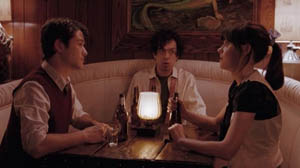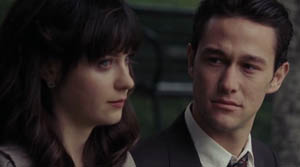|
"Summer" is a person. This film is not about these interminably long, roasting summers we keep having, all of which feel about five hundred days long, and suck. The film is much shorter, and doesn't suck. We are advised, right out of the gate, that this not a love story. Of course, it's a love story. We're just conditioned to assume that the term refers to a successful, happily-ever-after story, when love frequently finds its damned way into all manner of scenarios that don't last nearly that long. So why not give a few of those a voice occasionally? 
Tom (Joseph Gordon-Levitt) writes greeting cards for a living. Summer (Zooey Deschanel) is his boss's new assistant. He's instantly struck by the belief that she's the only girl in the world for him. She's not struck by any similar ideas, but finds she likes his company. But perhaps I'm getting ahead of myself. The film starts somewhere in the middle of the five hundred day time span, where we see that things aren't going to go as hoped. Throughout its length, the film shuffles through time-days early in the tally are the highlights and happy times, those in the middle, not so much. Later days move towards hope, and eventually, towards acceptance. We know from the beginning that the road will be a seriously bumpy one, yet we can't seem to want to discourage things at first, on the off chance that this will be the one time that characters in a film will actually heed our advice. He has a mad crush on her. She doesn't believe in long-term, and doesn't want a relationship, though she's not averse to stealing kisses at work and furniture shopping and banging in the shower. Is he okay with a non-committal arrangement? Our insides want to crumple up and hide at this. It's a terrible, unwinnable situation. If he's honest and says no, his chances are zero. If he says yes, at least it's a way in, and more than likely an eventual way right back out again. Of course he says it's all right with him, and of course it's a bad decision, all the worse because it's not at all obvious how bad it is to start with. It's a simple story, old and familiar, but generally well-told. Most of us know how this feels, which makes character empathy come quite naturally. We've met that vivacious and offbeat girl and been suckered in by her unspoken promise of a life more exciting, only to find that her moods swoop and crash like a sine wave; the cost of that wild persona is a lack of stability, and sure, even if we were cautioned ahead of time that nothing would, could ever come of it, to admit that to yourself is to admit that life is simply going to suck while you sit by and let it go on its way. The meandering course through time allows for seemingly innocuous setups to have weighty consequences, to painfully illustrate attempts to resurrect old magic that once brought such impish glee and now feel obvious and desperate, or to simply demonstrate the ponderous, often tedious nature of mourning a lost cause. In its most effective scene, the film shows a vivid contrast between expectations and reality via one of the best uses of split screen to date; Brian De Palma should take notes. 
To say that it's generally well-told implies, of course, that sometimes it falters and jarringly reminds us that we're in the familiar old neighborhood of Movieland. Young children are not bottomless founts of wisdom regarding adult affairs except in screenplays. Hollywood overall has a problem in writing sages, as these days they're either precocious kids or madmen; check out any random M. Night Shyamalan film for a handy example of either, or both. It also seems as though the male protagonist in any contemporary coming-of-age dramady has the same two friends. You know the ones: those laconic, smart-alecky post-stoners with far less experience or good looks who are always the sidekicks and never the lead, or for that matter, like anyone we personally know in real life. And whenever a screenplay starts talking about Fate with a capital "F," I can't help but cringe slightly, as movies always answer this issue in the same exact way, perpetually lacking the balls to just admit that the universe is simply a place in which events occur, and not something with a conscious interest in making our lives play out like stories. (500) Days of Summer may not be a great film, but it is a film about a depressing topic that manages not to be a depressing watch. It's not always perky and it's not always brilliant, but it has personality, much like its two leads, who bring out the best in the material. Even the fate-esque final joke, obvious that it was, made me grin. -review by Matt Murray
|
|
||||||||